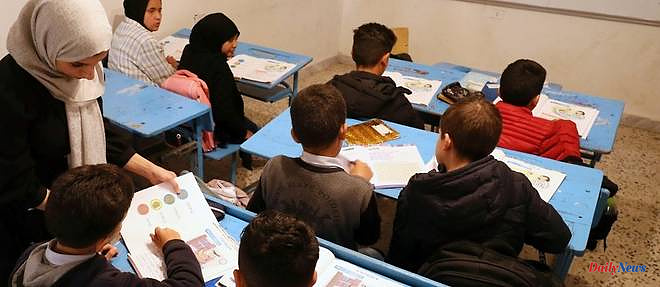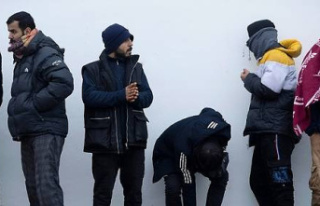The pupil hesitates then, encouraged by the teacher, brings the marker to the board and scribbles a few characters in Tamazight. The scene seems rather banal but, twelve years earlier, in Gaddafi's Libya, it was unthinkable.
This child is learning the language of a once oppressed community in a classroom in Zouara, an Amazigh (or Berber) town in northwest Libya, near the border with Tunisia.
And the other CM2 students follow one another on the board, under the demanding but benevolent gaze of the young teacher, in a black dress and gray veil.
"Children love this subject because they find their identity and their culture in it," rejoices Assirem Chouachi, the Tamazight teacher. “It's not just about the alphabet and vocabulary, but it's a cultural whole that we pass on to them,” she says as the children go to recess.
120 kilometers from the capital Tripoli, the flag, the symbol and the alphabet of the Amazighs stand proudly in Zouara, as elsewhere in Libya, since the death, in the midst of the 2011 revolution, of Muammar Gaddafi.
During the four decades of his dictatorship, the Amazighs were condemned to a clandestine orality, being able to speak their language only at home or in the street, but always far from the ears of the police, the administration or the media.
For Gaddafi, Libya was exclusively Arab. The approximately 10% of Amazigh Libyans are, however, part of the large indigenous population of all of North Africa, present long before the Greek, Roman and then Arab conquests in the 7th century.
In a country divided into rival camps vying for power, the government recognized by the UN is keen to spare the Amazigh community and now provides Tamazight textbooks, without however making the language official.
For the youngest pupils, who have not known life under Gaddafi, "it is just a natural right to learn their mother tongue and they do not imagine that anyone can forbid them to do so", observes Assirem Chouachi, she - even from the first Libyan promotion of Tamazight license, issued last year by the University of Zouara.
If she hopes for even more recognition, the teacher is delighted with the “enormous advances already made in just ten years”. "We ourselves are surprised", exults the teacher who, after the revolution, immediately obtained Tamazight textbooks published in Morocco.
In Zouara, the first courses were given in 2012, with "difficult beginnings" due to a lack of trained teachers and uncertainties around the program to be followed, recalls the director Sondoss Saki, after making sure order in the playground.
It was even necessary to convince the parents of pupils who feared linguistic overload, judging Arabic and English as priorities for studies.
"But the children come to learn and their minds are wide open to knowledge," says the director with confidence, the Libyan and Amazigh flags enthroned side by side on her desk.
His classes finished, Assirem Chaouachi heads to the small studio of Kasas FM, the first local radio station in the Tamazight language. While a national Berber-speaking station was recently launched from the capital Tripoli, Kasas FM has been broadcasting since 2012.
Also a radio presenter, Assirem Chaouachi discusses with Ismaïl Aboudib, the program director, the next episodes of his program devoted to Amazigh literature.
In a white shirt and gray blazer, the 28-year-old young man, also an architect, has also made it his "duty" to defend the "rights" of his community.
And Kasas FM is one of the ways of "meeting the expectations" of the inhabitants of Zouara, he assures us, after making some adjustments on the small mixing desk.
Society, culture, religion, entertainment, sport: the radio addresses "all the subjects that interest listeners in the language they know best", he says, behind his large glasses with transparent borders.
For him, "respecting his language and being proud of his identity" does not prevent him from "living with other communities". On the contrary, these new rights make it possible "to move forward together without remaining haunted by the time of persecution".
“The whole world is made up of diversity,” he notes. "And it is also the right of all Libyans to live in this harmony."
29/03/2023 16:55:56 - Zouara (Libya) (AFP) - © 2023 AFP












